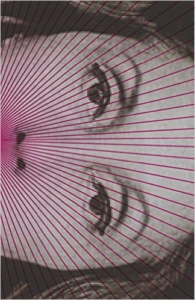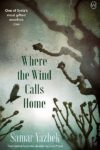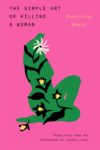 Clarice Lispector (1925-1977) was a Brazilian author whose work is known for its philosophical depth, modernist stylistic tendencies, and keen observations of everyday life. This fall, New Directions published The Complete Stories, which collected Lispector’s short works, written from her teenage years up until the end of her life, in a translation by Katrina Dodson. In honor of this publishing event, Full Stop contributors Becca Rothfeld and Nathan Goldman conducted an in-depth dialogic inquiry into Lispector’s short fiction over email, in which they discuss her embrace of the body, her linguistic innovations, and her interrogations of gender, sexuality, and the boundaries of the human. Please continue to check back on the site to share in their conversation over the course of this week.
Clarice Lispector (1925-1977) was a Brazilian author whose work is known for its philosophical depth, modernist stylistic tendencies, and keen observations of everyday life. This fall, New Directions published The Complete Stories, which collected Lispector’s short works, written from her teenage years up until the end of her life, in a translation by Katrina Dodson. In honor of this publishing event, Full Stop contributors Becca Rothfeld and Nathan Goldman conducted an in-depth dialogic inquiry into Lispector’s short fiction over email, in which they discuss her embrace of the body, her linguistic innovations, and her interrogations of gender, sexuality, and the boundaries of the human. Please continue to check back on the site to share in their conversation over the course of this week.
(Read the first part of the exchange here and the second part here)
Hi Nathan,
As ever, thanks for this really thoughtful and thorough reply. There’s so much here! As we attempt to wind our discussion down, I think I’ll try to home in on our points of disagreement and ongoing confusion. We seem to have dispatched the gender question, insofar as anyone can definitively “dispatch” such a tricky thing, so I’m going to focus on two thorny issues that seem to remain unresolved: Lispector’s relationship to language, and her stance on the relationship between humanity and animality.
I think you’re right and astute to observe that Lispector is, as experimental authors go, relatively tame and linear. I imagine that her language is slightly weirder in the original — at the talk I attended, Moser also emphasized that many of the phrases she favors are odd largely because sound like established Portuguese expressions but aren’t — but it certainly isn’t as weird as Stein’s or Joyce’s. I wouldn’t say that the narratives she constructs are conventional, because in many of them all the drama is internal and there are few external events to speak of. But you’re right that even her more meditative stories are legible reflections in a way that Stein’s certainly aren’t.
I think your explanation of Lispector’s linguistic subversion is compelling. After all, an attempt to defamiliarize language would be closely aligned with Lispector’s core interest in exposing the strangeness of bourgeois convention, as she sets out to do in so many of her stories about disaffected housewives. But I think that she’s also abidingly afraid — and convinced — of language’s fundamental inadequacy. “Something still escapes the compass rose,” she writes in “Manifesto of the City,” and a few paragraphs later she emphasizes the disparity between the word “horse” and its embodiment: “if this was a word echoing off the hard ground, what do you mean? How hollow is this heart in the center of the city.” Her attempts to overcome language’s failings are unusually effective, but I think that she’s ultimately disappointed by them nonetheless: the story concludes with the ambivalent line, “and from such large hands emerges the embarrassed word,” a tremulous confession of her love for an unnamed man.
Why, then, does she continue to write, even when she sets for herself such impossible tasks as describing silence that “leaves no trace”? I think that she’s likely reconciled to making the best possible use of the only medium available to her. You can “try to fool” the silence, but such an effort is the product of “a useless hope” — and this silence, this unspeakability, is inescapable, permeating sometimes even into “the very heart of the word.” Nonetheless, words are all we have.
I’m not sure what I think of your point about the aesthetic functions of language. Certainly Lispector’s prose is beautiful, but I suspect somehow that she would be resistant to traditional notions of beauty and more interested in other sorts of virtues, especially vitality. Often her descriptions of the things that most fascinate and compel her are (intentionally, it seems to me) repellent and unbeautiful, if striking: the garden in “Love” is like “a revulsion that precedes a surrender,” and the teacher with whom the narrator is in love in “The Disasters of Sofia” is “very big and very ugly.” So I imagine that her interest in language and linguistic subversion is aesthetic, insofar as it’s concerned with the effects language produces and the affects it conjures, but I don’t know that beauty, straightforwardly conceived, is her aim.
As for this discussion of animality/humanity, or physicality/spirituality, what a lot to be said! You’re worried about ascribing prescriptive intent to Lispector’s equivocal prose. I suppose the answer to this question hinges partially on the answer to broader questions about authorial intent and literary interpretation, but I think there’s a fair amount of textual evidence to support the notion that Lispector’s writing, if not Lispector herself, privileges one mode of being over another. I’ve cited some of this evidence in earlier emails, but here’s more: for instance, in “Dry Sketch of Horses,” she writes, “the form of the horse represents what is best in the human being,” which I take to mean that our inner animality is the best or most praiseworthy part of our humanity. You agree that Lispector, or at least her work, seems to critique hyper-rational orientations towards the world, and I think that the textual evidence that supports this thesis is no more definitive and no different in kind than the textual evidence that supports her preference for the animal over the human. Of course, literature isn’t philosophy, and it’s hard to sketch out exactly what Lispector would have us do as a means of repudiating the over-intellectual parts of ourselves. Nonetheless, her work seems to suggest that it would be better for us to immerse ourselves in life rather than theorizing about it.
As for your second question and the way I’ve defined animality — that is to say, as too fully inhabiting an immediate, untheorized present to imagine or want an alternative — there’s another chicken we’ve neglected thus far. In “The Chicken and the Egg,” she seems to pit the organic against the analytic. To incorporate the egg into the perceptual schemas through which we invariably filter it — the schemas that enable us to conceive of a series of sense perceptions as an egg at all — is also to negate something of the egg’s essence: “when one sees the egg it is too late: an egg seen is an egg lost.” To understand the egg as such — to conceptualize it, as we invariably do when we happen upon it — is to undercut some of its force, which is a function of its raw existence rather than the way in which it figures in our system of wants and uses. Sort of tangentially, this reminds me of Heidegger’s writings on “taking as”: to take an object as is to impose a functional framework upon it, to think of it in terms of its use/value and not in terms of its Being. When the narrator of “The Chicken and the Egg” looks at the egg in the kitchen, “all [she] see[s] in it is food,” its potential to satisfy a human need.
Unlike the narrator, the chicken seems able to relate to the egg on its own terms. It is in some sense an extension of the egg, an existence reduced to its existing: “Being a chicken is the chicken’s survival. Surviving is the salvation. Since living doesn’t seem to exist.” Though some chickens, admittedly, have the sets of personal desires and preferences that ultimately constitute egos, these are the chickens whose outlooks prove antithetical to the egg’s quiet persistence, thus traitors to their own animality. “The chickens who harm the egg are those who are a ceaseless ‘I’,” Lispector writes. I take this to mean that she endorses a mode of being that is not quite inanimate but not quite animate either — it’s carnal and vital, but it is too engrossed in its environment to think to want to alter it. Lispector seems to indict the animals that drift towards the human by harboring desires.
Finally, I think it’s interesting that chickens are such a recurring motif in Lispector’s writing, because they aren’t animalistic in the obvious and impressive way that lions or tigers and such are. What do you make of this? I think perhaps Lispector wants to defamiliarize us to a more domestic animal, to emphasize its hidden or overlooked animality, in much the same way that she wants to call attention to the strangeness of, for instance, language.
That’s all for now!
Best,
Becca
—
Hi Becca
Once again, you’ve made many excellent points eloquently and have given me a lot to think about. I’m glad you chose to focus on the issues on which we seem to see matters differently. I think that’s a good way to make the most of this medium of criticism.
Let’s talk language. I appreciate your reminder that we’re at a disadvantage on this front as readers of translations (however adept) of the words Lispector herself wrote, and I agree that her narratives, though legible, are never quite conventional. Ultimately, on the subject of “language’s fundamental inadequacy” and Lispector’s fear of that fact, we’re in agreement. Though I don’t know enough about Lispector’s personal history or self-commentary to speak with much certainty about how she felt re: her own project, I think the text of the Complete Stories itself supports your claim that she was disappointed in how far she could stretch language. To your astute readings I’ll add that Lispector’s fluctuations in degree of experimentation over the course of her career and her persistent reticence to categorize her work simply (from the bibliographical note: “Lispector was no respecter of genres. Many of her writings were presented as journalism but are clearly fictional; many published as fictions might be more comfortably classified as memoirs or essays; and so on”) betray an unease I see as evidence of a continuing attempt to find the right way of writing the world as it is. If that’s right, it’s in essence a doomed project, however worthwhile the existence of the many failed attempts — and maybe this is something she always knew.
However, I think there’s a way of framing Lispector’s body of work — taken as a testament to the inadequacy of words, rather than a struggle against it — as representing a coherent and defensible aesthetic vision and a project taken to completion. As often as Lispector’s words capture with precision the essence of a moment, they retreat from the object of description, surrounding it, gesturing toward it, suggesting it, or negatively indicating it. Lispector likes to elide the unnameable — profound feelings, divine mysteries, unaccountable objects and experiences — rather than name them inadequately. (Thus why we find in her work more mentions of “things themselves” than I’ve ever encountered outside the work of a German philosopher.) Whether or not this strategy is a poetics she explicitly conceived, to me it’s a powerful one — and if I think of Lispector’s project as (in part) pushing language to its limits while also resisting abusing it to name what it has no business naming, then I think she succeeds. In my view it’s not an either/or situation; Lispector’s work might do all these things we’ve been discussing and others, succeeding and failing in different ways.
You’re right to push back on my thoughts about the relevance of beauty in the language. If we’re talking about many traditional philosophical as well as colloquial notions of beauty — say, orderliness or formal pleasingness — then yes, I absolutely agree that these aren’t of primary interest for Lispector. I used the term haphazardly and now think it’s best to back away from it and start from something much more interesting you said. But before I do that, I’ll say another quick word about the kind of thing I had in mind by “beauty.” I’ll take advantage of your mention of Heidegger (tangentially: I think there are many interesting points of harmony and dissonance between his thought and Lispector’s, particularly on the issue of language) and cite his “The Origin of the Work of Art”: “Beauty is one way in which truth essentially occurs in unconcealment.” Whatever he means by that is way beyond the scope of our conversation. I only bring it up to point to the kind of thing I had in mind with the word: something tied less to pleasure or order or removed contemplation than to engagement with something deep and vital in things.
Anyway, I strongly agree with this, from your last email: “I imagine that her interest in language and linguistic subversion is aesthetic, insofar as it’s concerned with the effects language produces and the affects it conjures.” That’s a much better way of saying what I’m interested in by bringing up the aesthetic at all. It seems to me that, at least in fiction, language orchestrates the reader’s experience of the fiction. Isn’t that another way of getting around language’s inadequacy to the task of communicating primal truths? Meaning happens not just propositionally, but also as an event — cognitive, spiritual, and bodily — and if language can summon such an event, it has made meaning in a way that is not merely communicative or intellectualizing. If Lispector’s work moves us in some fundamental way, hasn’t it succeeded in returning us to our animal bodies after all — even if, circuitously, by means of some of what is least animal in us?
Those are some big claims and questions I feel good about now but might later regret. A more humble (though still grandiose) version might be: What is fiction for, anyway? I think that’s the kind of fundamental question — along with questions about what kinds of hermeneutic methods are useful or important — that you rightly point out is the truest space to address the question of the prescriptiveness of Lispector’s stories. I’m totally with you that the work “privileges one mode of being over another,” and I believe our disagreement (if we disagree) hinges on those more fundamental questions. I think the nature of Lispector’s relationship to the “positions” in her work comes down to her answer to the question about fiction’s aims and to ours. Personally, I’m inclined to say something like: Lispector’s work helps us stand where she stands, in a space where we see the pernicious aspects of our humanity as she does. Perhaps the next step is that, having stood there, if we’ve been moved, we must now move — change our behavior or not, either way a choice. I agree Lispector herself would have us change, and it’s very possibly splitting hairs to try to distinguish that from what you’ve said — but even if it is, I think you can see why part of me wants to nitpick.
(I think I’ve said enough on that, but one last aside: I agree with you that “literature isn’t philosophy,” and like you, I’m very interested in both, and I find explicitly philosophical fiction such as Lispector’s exciting both in itself and as an opportunity to think about the kinship and difference between these two forms of inquiry.)
As for animals, I found your reading helpful in illustrating your understanding of Lispector’s take on the difference between humans and animals. My disagreement, I think, is not about the general distinction you’ve made as much as it is with making it an absolute one. I’m now thinking that we’re of the same mind on that. I’ll buy that Lispector is critical of the more egoistic chickens in the same way that she’s critical of the more intellectual humans, and that the modes of being she privileges are those more typical of the fly than the human. I’d like to emphasize, though — and perhaps our disagreement is really a disagreement about emphasis or what interests each of us most deeply — your point that “some chickens . . . have the sets of personal desires and preferences that ultimately constitute egos.” For Lispector, the division between “human” and “animal” traits is fluid, not essential. We are not animals with an additional soul faculty (as for Aristotle), nor are we something other than animal entirely (as for Heidegger); we are a kind of animal, maybe with different tendencies and capacities, but not so different that we can’t share certain virtues and vices. I find this take on our relationship to animals compelling. I like your answer to the question of why the chicken, that it brings forth the animal in the domestic, as her prose does the strange in language. I’ll add that the use of the chicken troubles distinctions: between outside and inside, nature and culture, and yes, animal and human.
It has been a true pleasure to go back and forth with you on these fascinating issues in this tremendous book. Thanks for the excellent conversation!
Best,
Nathan
Becca Rothfeld is a freelance book critic and a graduate student in the history and philosophy of science at the University of Cambridge
Nathan Goldman is a writer living in Minneapolis. His work appears in the Los Angeles Review of Books, The Millions, Word Riot, and other publications.
This post may contain affiliate links.







